Subrina Ntakirutimana, 39, has taken the extraordinary step of sleeping outside of the United Nations Human Rights Council offices in Cape Town. She believes it’s the only way she will be able to get her and her two children to safety.
“I’m not thinking about myself when I’m sleeping here, I’m thinking about my kids’ future,” said Ntakirutimana. She and her first child fled Burundi in 2008. She gave birth to her second child shortly after arriving in South Africa, who is now of school-going age but does not have the required documentation to be admitted to school.
“This government will never accept them. We need to provide a better future for them but there is no future for them in this country,” said Ntakirutimana.
When Daily Maverick visited the United Nations Human Rights Council (UNHRC) offices in Cape Town last Thursday evening, migrant parents and children were eating dinner from takeaway containers and setting up to sleep for the night. Placards were erected which read “We are not safe in South Africa” and “Refugees need a safe place to go outside South Africa”. One family carried an inflatable mattress while others lugged cardboard boxes to place under duvets and throws. Babies as young as three months were cradled in their mothers’ arms. Many had been there since the Monday and remain there still.
“We are going to stay here until they take out [of the country] all the refugees and asylum-seekers,” said Alimasi Elysee, who is from the Democratic Republic of Congo. “A lot of people here have a problem with their documents because of Home Affairs. We are not happy here. We just want to go, to leave South Africa.”
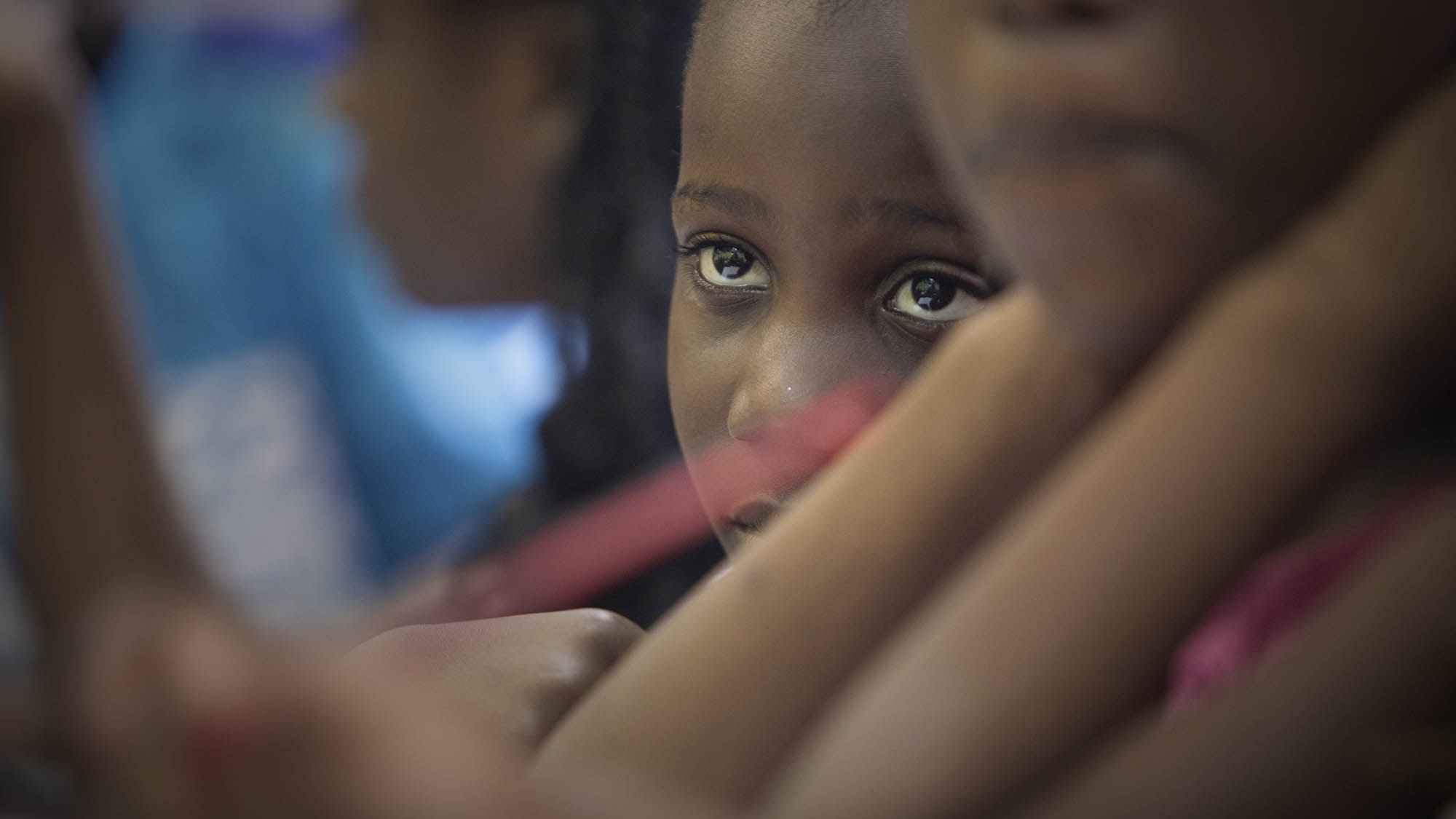 Undocumented migrant children attend a class at the Refugee Social Services at the Diakonia Centre in Durban. (Photo: Leila Dougan / Daily Maverick)
Undocumented migrant children attend a class at the Refugee Social Services at the Diakonia Centre in Durban. (Photo: Leila Dougan / Daily Maverick)
Sylvia Nahamana, 44, an asylum-seeker from Burundi, said many of the children sleeping outside the UNHRC offices were born in South Africa but do not have birth certificates which means they cannot go to school, write Matric exams or go to university.
According to the Department of Home Affairs, an asylum-seeker is a person who has fled his or her country of origin and is seeking recognition and protection as a refugee in South Africa, and whose application is “still under consideration”.
In theory, the documentation process is pretty straightforward. Asylum-seekers are required to report to one of the Refugee Reception Offices within five days of arriving in South Africa. The offices are based in Musina, Pretoria, Durban and Port Elizabeth and, upon arrival, they are issued an asylum-seeker permit which they need to renew until their status is determined. The Cape Town Refugee Reception Office has been closed for the past seven years and even though it was due to reopen in March 2018, its doors remain firmly shut.
Department of Home Affairs spokesperson Siyabulela Qoza said there are 82 000 refugees currently living in South Africa with 184 976 documented active asylum-seekers as of 31 December 2018. A recent report by Amnesty International states the process should take up to six months, but thousands of asylum-seekers have been living in limbo for up to 19 years.
Qoza said the system was designed for “small numbers” because when South Africa became democratic “very few countries were at war” which means fewer people were fleeing their countries and seeking refugee status in South Africa.
“[W]e used to receive about 10,000 applications a year. During the global financial meltdown of 2008 we received 207,206 applications. This number shot up to 223,324,” wrote Qoza in an emailed response to Daily Maverick.
He said the annual numbers are declining, as “evidenced by the 18,345 applications received last year” and that many of the applications are rejected but the asylum-seeker protection system allows for rejected applications to be appealed.
“Many of the rejected applications end up on the appeals process. We are working with the United Nations High Commission for Refugees to reduce the backlog on the appeals,” wrote Qoza.
When asked what action the government was taking to assist migrant children, Qoza did not answer.
Asylum-seekers have the right to work, study and access basic education and healthcare but in reality, renewing their status and keeping their documentation updated is costly and time-consuming. Some asylum-seekers need to take time off work, travel long distances and wait in queues for hours before being attended to and when they finally reach the counter their status may not be renewed.
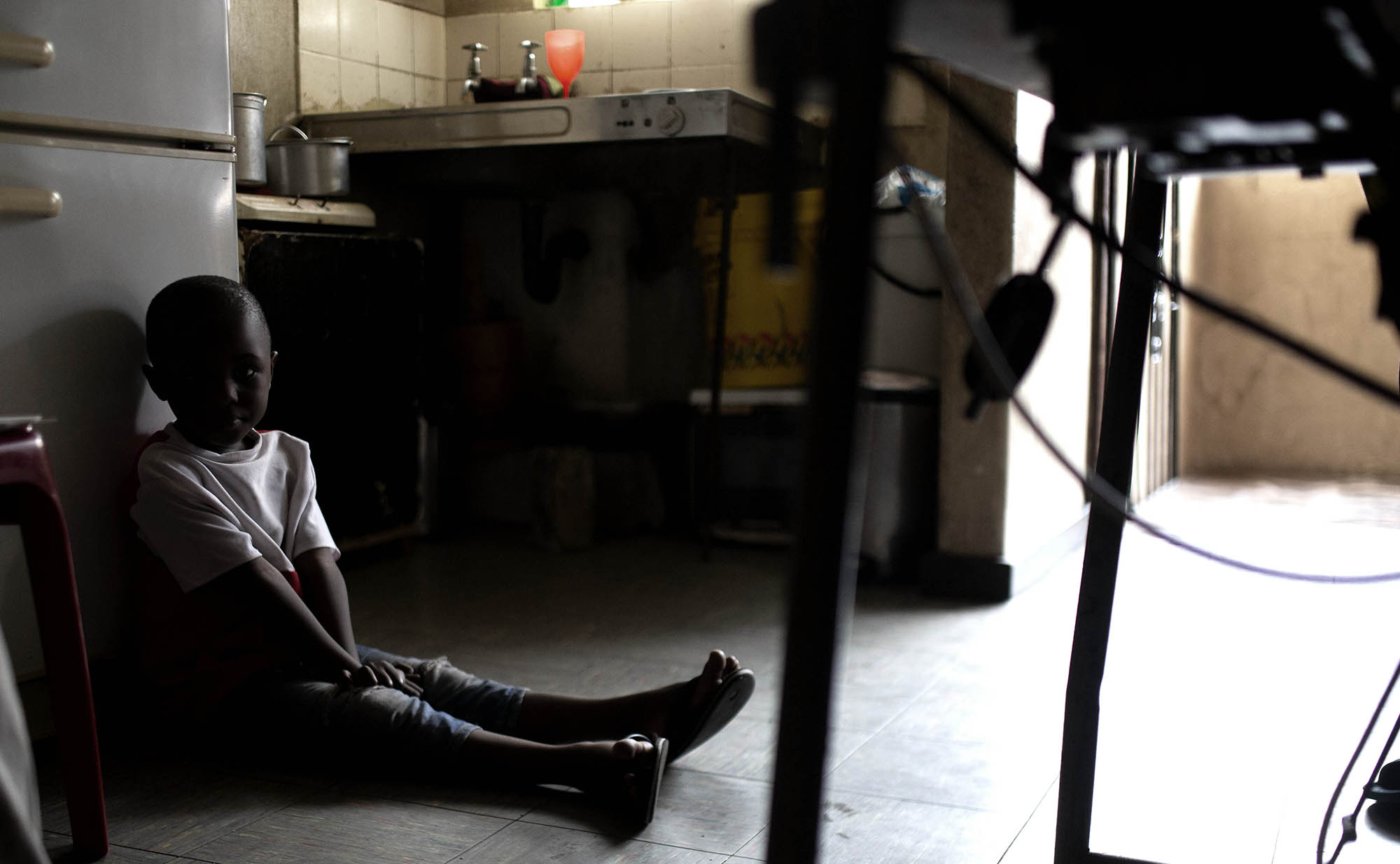 Emmanuel's son, who cannot go to school due to a lack of documentation, sits in his family home in Durban, KwaZulu-Nata. (Photo: Leila Dougan / Daily Maverick)
Emmanuel's son, who cannot go to school due to a lack of documentation, sits in his family home in Durban, KwaZulu-Nata. (Photo: Leila Dougan / Daily Maverick)
“Since January till now I’m trying to get documents for my children,” said Emmanuel*, 36, who fled the DRC in 2009. He crossed the South African border and hitched a ride from the border town of Musina, to Durban. His wife joined him a few years later with three biological children, two nephews and a niece. Their biological children have been issued asylum-seeker permits from the Refugee Reception Office which requires renewal every few months. But their two nephews, aged eight and 10, and niece, aged 15, do not have any documentation and cannot go to school.
“Things are difficult here. I don’t have a small family and with six kids to feed it’s not easy. I can’t say it’s a good story, I’m not happy here, my children don’t have anything to do here, they can’t go to school,” said Emmanuel, who spoke to Daily Maverick at his home in Durban.
Yasmin Rajah, Director of Refugee Social Services at the Diakonia Centre in Durban, has clients all over KwaZulu-Natal who are asylum-seekers predominantly from the DRC, Burundi, Rwanda and Ethiopia. Emmanuel is one of her clients. The non-profit assists asylum-seekers in Durban and greater KwaZulu-Natal by providing emergency social assistance including food, accommodation, medical care, counselling and child protection services. The centre also provides life skills training and French and English classes for learners who cannot be placed in schools due to a lack of documentation.
Refugee Social Services has been running since 2001 and Rajah said one of her greatest concerns when it comes to asylum-seeking children is that they are constantly at risk. At best they are excluded from essential services, at worst they can be deported.
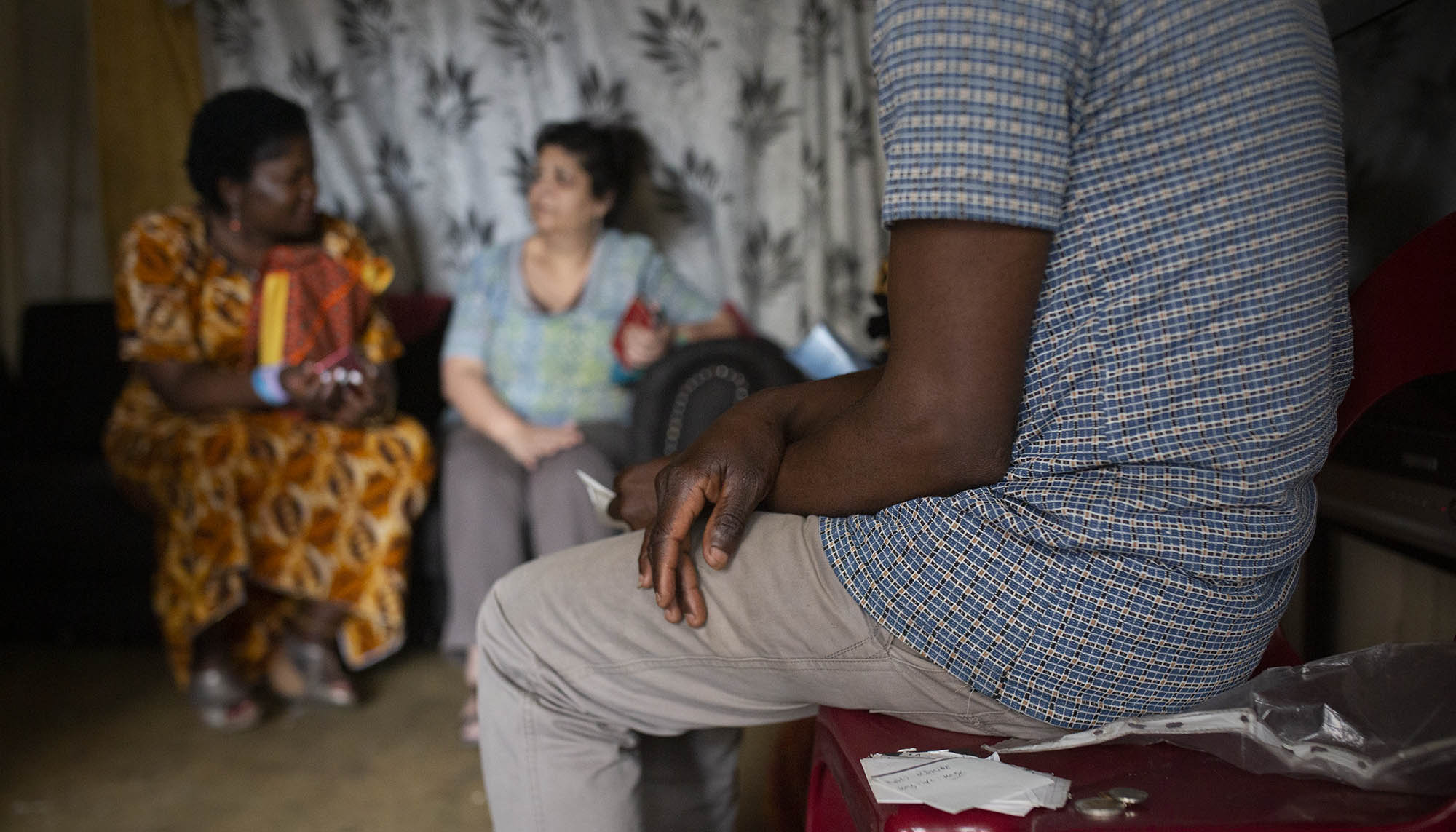 An asylum-seeker from the Democratic Republic of Congo, speaks to the director of Refugee Social Services, Yasmin Rajah, in Durban, KwaZulu-Natal, 9 October 2019. He lives with his wife and six children. Three of his children are unable to go to school due to a lack of documentation. (Photo: Leila Dougan / Daily Maverick)
An asylum-seeker from the Democratic Republic of Congo, speaks to the director of Refugee Social Services, Yasmin Rajah, in Durban, KwaZulu-Natal, 9 October 2019. He lives with his wife and six children. Three of his children are unable to go to school due to a lack of documentation. (Photo: Leila Dougan / Daily Maverick)
“We’re often seeing children coming in without documentation from outside of the country. If they’re coming separated, without a parent, or unaccompanied, it’s very difficult for them to get documentation here,” said Rajah.
She has dealt with hundreds of cases where asylum-seeking children cannot access healthcare services or go to school. “It goes against your rights as a child,” said Rajah. “Our Children’s Act talks about children, it doesn’t talk about nationalities, and yet we put nationality front and centre, we look at them in terms of nationality rather than looking at them as children. Our laws, our policy, does not fit in with the Constitution.”
According to a report on migrant and refugee children in care, released in July by the NPO, the Scalabrini Centre of Cape Town, a third of the surveyed children fled to South Africa due to conflict, war or persecution in their country of origin. The study found that 39% of the surveyed children born to foreign parents in South Africa did not have a birth certificate and 40% of them have no documentation at all, rendering them at risk of statelessness.
Statelessness is defined by the United Nations High Commission for Refugees (UNHCR) as people who are not considered nationals “by any state under the operation of its law”. Being undocumented is not the same as being stateless. However, lacking birth registration can put people at risk of statelessness. The UNHCR estimates that at least 10 million people around the world are stateless.
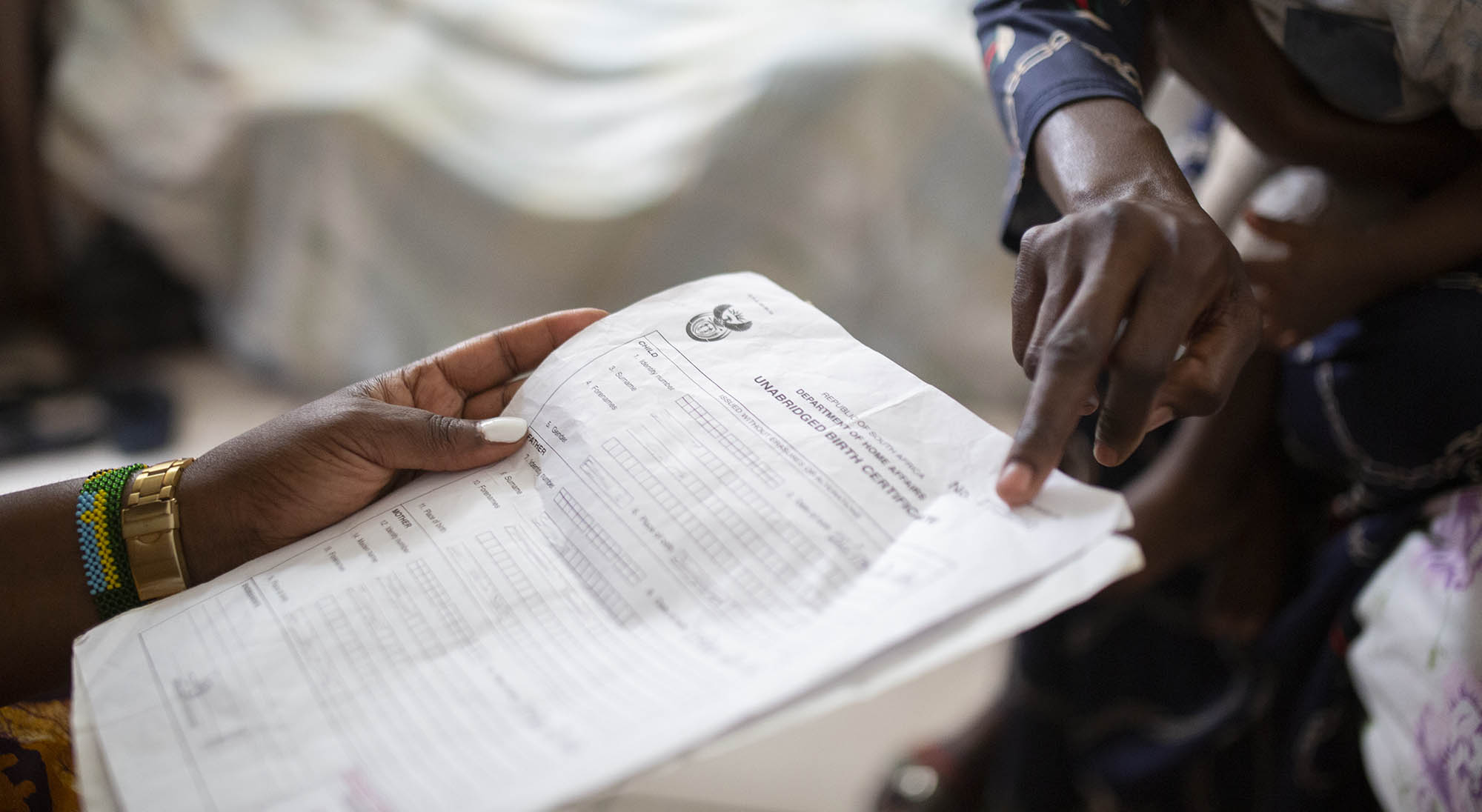 A woman points out one of her children's recognition of birth certificates while holding her baby in Durban, KwaZulu-Natal. (Photo: Leila Dougan / Daily Maverick)
A woman points out one of her children's recognition of birth certificates while holding her baby in Durban, KwaZulu-Natal. (Photo: Leila Dougan / Daily Maverick)
Rajah argues that unaccompanied children and children born to asylum-seekers in South Africa who do not receive birth certificates are at risk of statelessness, as are asylum-seeking children who flee their country of origin and arrive without documentation. She said our bureaucratic processes need to take the reality of migration into consideration.
“When people flee, they don’t flee together,” said Rajah, adding that when it comes to forced migration there are a host of different stories as to how and why people have fled.
Rajah said sometimes when people flee they leave their children behind. Often the man flees first and, if he is married and has children, his spouse will join him once he has settled in his new home. But if the husband or partner, who entered South Africa first, did not declare the rest of his family members upon arrival, his wife will have to open her own case and file, with the children being her dependents.
Sometimes other issues arise. If a child flees with a relative the South African state may require the child to approach the Department of Social Development for a social worker’s report and a possible foster care order. Only then can the relative help the child with an asylum-seeker application.
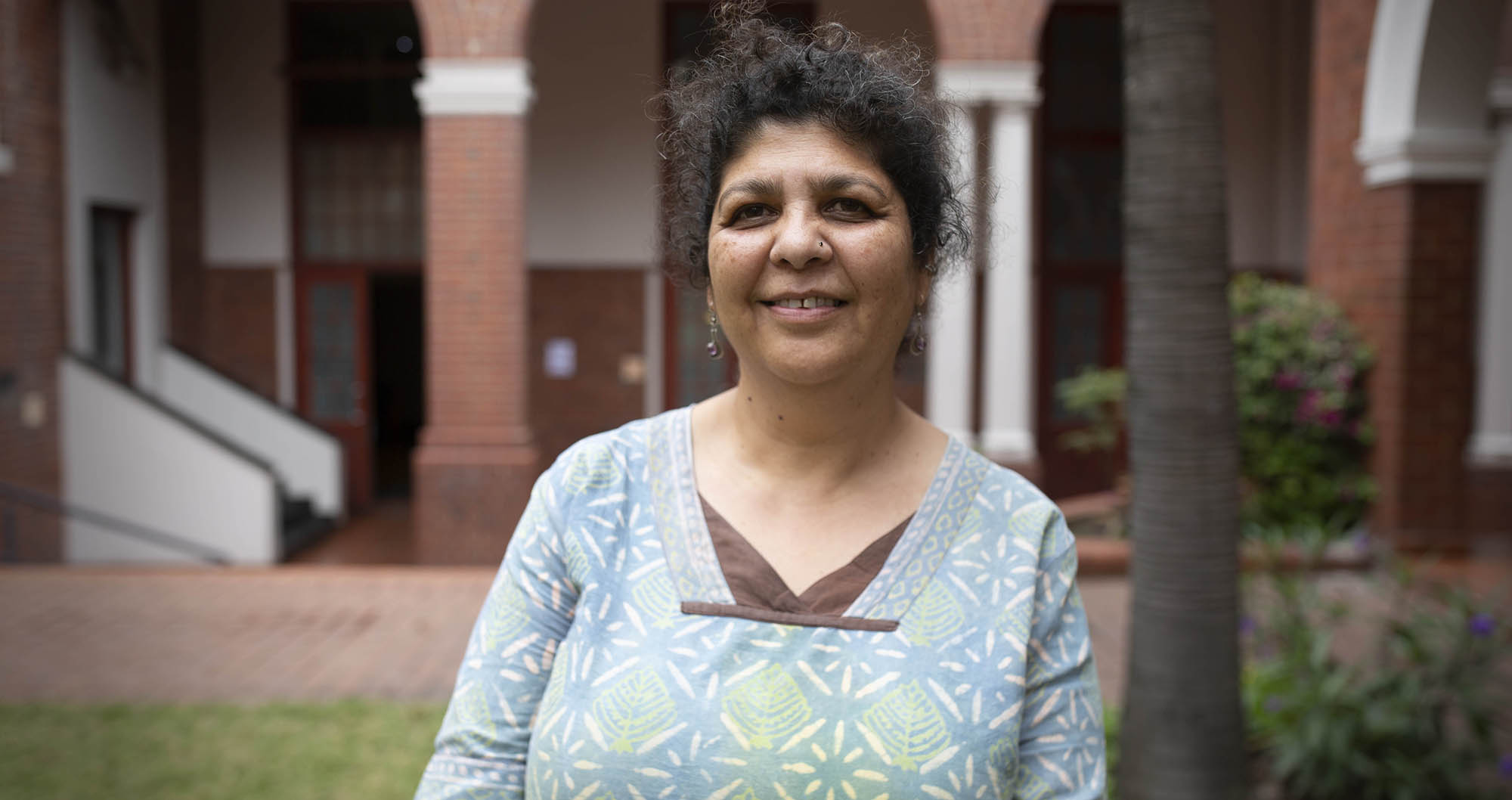 Director of Refugee Social Services, Yasmin Rajah, outside her office in Durban. (Photo: Leila Dougan / Daily Maverick)
Director of Refugee Social Services, Yasmin Rajah, outside her office in Durban. (Photo: Leila Dougan / Daily Maverick)
Rajah explains that if a child comes into the country unaccompanied and without any documentation, Home Affairs will redirect them to the Department of Social Development. A social worker will be assigned to the unaccompanied child and they will be brought before the Children’s Court. The process can take months, even years, to complete, while unaccompanied children will struggle to access public schools and hospitals.
“It’s chaos,” said Rajah.
When it comes to the Children’s Court, which falls under the Department of Justice and Constitutional Development, one of the greatest challenges is the interpretation of the law, according to Thandeka Duma, an attorney for Lawyers for Human Rights.
“On the one hand you have the Refugee’s Act, and then you have the Children’s Act that is saying something else. When you go to court, the Children’s Act says you need documents to prove that your mother or father has died, for instance. But you will have a migrant child that says ‘I don’t know where my mother is, I don’t know where my father is, we separated’.”
“While this statement is acceptable under the Refugees Act as affidavits and sworn statements can be provided, the Children’s Court refuses to finalise such cases without death or birth certificates,” said Duma.
The file usually remains in court until the child is 18. At 18 they can apply at the Refugee Reception Office for asylum. Through legal intervention from Lawyers for Human Rights, some asylum-seeking children have been able to go to school, said Duma. But even the successful cases hit a snag when it comes to their final exams.
“Once they get to Grade 12 they would be unable to write their Matric exams without some form of documentation,” said Duma.
Lotte Manicom, advocacy officer at the Scalabrini Centre, said statistics on asylum-seeking children are difficult to determine because often children are documented as dependants and documented together with their parents or guardians in a single asylum file at Home Affairs.
“For example, the family unification process at Home Affairs, commonly known as ‘family joining’, provides that dependents (such as spouses and children) of an asylum-seeker or refugee can be documented together in a single refugee file, receiving the same documentation status as the principal applicant,” said Manicom.
Fewer than one in six asylum-seekers in South Africa are granted refugee status. This is according to parliamentary replies by Home Affairs Minister Aaron Motsoaledi to written questions by IFP MP Liezl van der Merwe, EFF MP Vuyani Pambo and DA MP Joe McGluwa.
A recent News24 report states that over the past decade, the Department of Home Affairs has processed 633,395 applications, but only granted 99,624 of these applications, a mere 15% success rate for asylum-seekers applying for recognised status as refugees.
James Elder, UNICEF Regional Chief of Communication for eastern and southern Africa, said unaccompanied or separated children are especially vulnerable and are at higher risk for statelessness, trafficking and illegal adoption. He said the problem cannot be reduced to the South African asylum system as many children and adults are not issued with documents in their country of origin.
In Zambia’s capital of Lusaka this week, ministers from the eastern region of the continent are gathering to discuss this very issue at the 5th Conference of African Ministers responsible for Civil Registration and Vital Statistics. The conference is focusing on civil registration for adults and children to reduce statelessness as about half of all children in Africa currently are not registered at birth.
“It is important that the states establish robust civil registration services, this includes birth registration, so that migrant children can carry their birth certificates; and in cases where this is not possible, birth registration data could at least be retrieved from the country of origin, in an ideal situation,” said Elder.
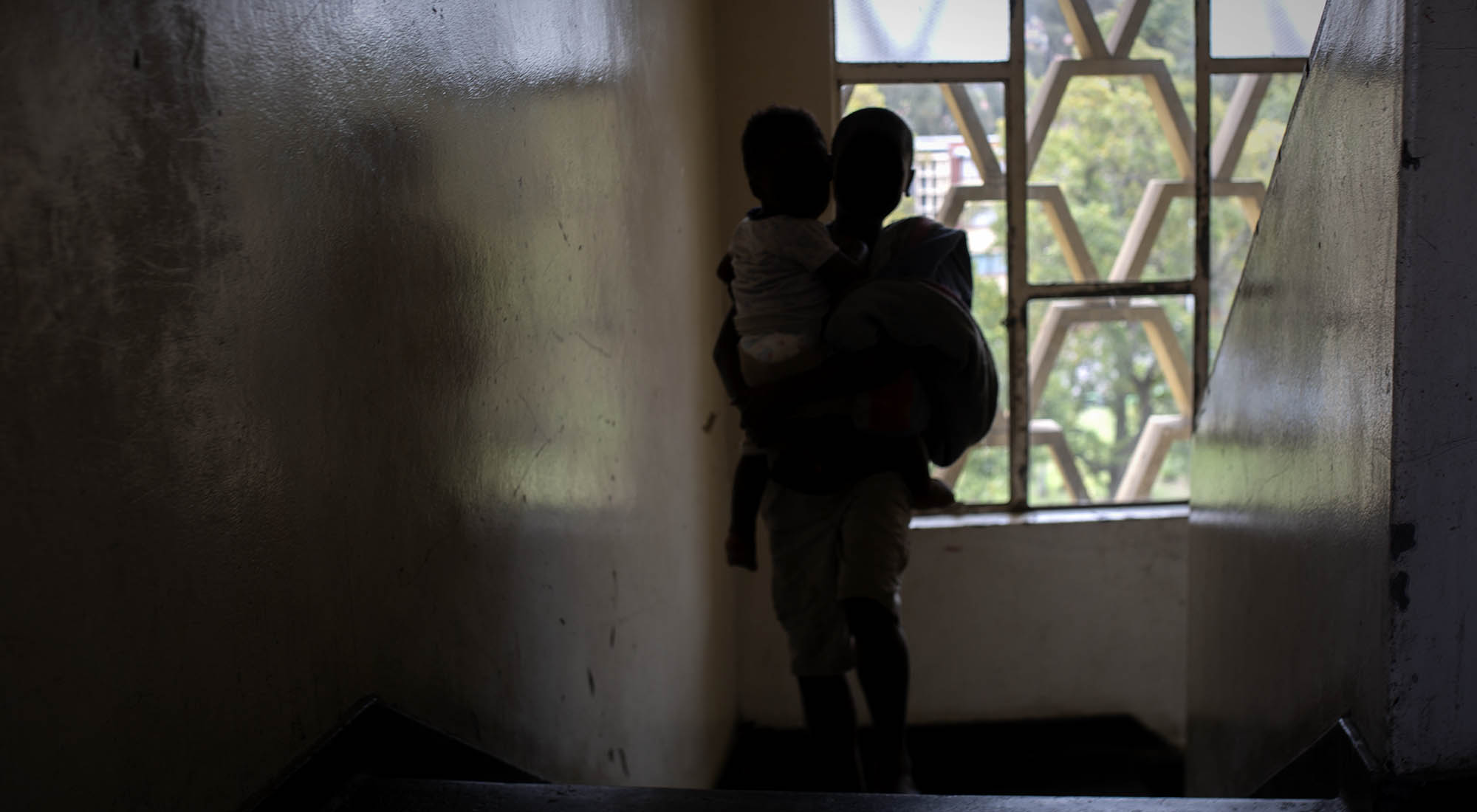 Migrant children in Durban climb the stairs to the apartment where their family lives on the ninth floor. (Photo: Leila Dougan / Daily Maverick)
Migrant children in Durban climb the stairs to the apartment where their family lives on the ninth floor. (Photo: Leila Dougan / Daily Maverick)
“It’s sad to think that there are millions of people who are stateless,” said Rajah, adding that asylum-seeking children in South Africa should be given the opportunity to settle into a new life rather than being “revictimised by a broken asylum system”.
“There are people who abuse systems, that will happen everywhere in the world, and the people who abuse systems get in anyway, those who are doing organised crime for example. So if you are thinking security needs to be beefed up, it’s not the security, in my opinion,” said Rajah.
“People move. They migrate for different reasons. Fixing the system requires political will. It requires an attitude that people migrate for various reasons. Climate change, poverty, war. And yet we’ve put up these artificial borders,” said Rajah. “When you talk about refugees, what you’re really talking about is people and their quest for safety.” DM
* Names have been changed to protect identities.
UNICEF provided funding for accommodation and travel for the reporter to visit the Diakonia Centre in Durban.




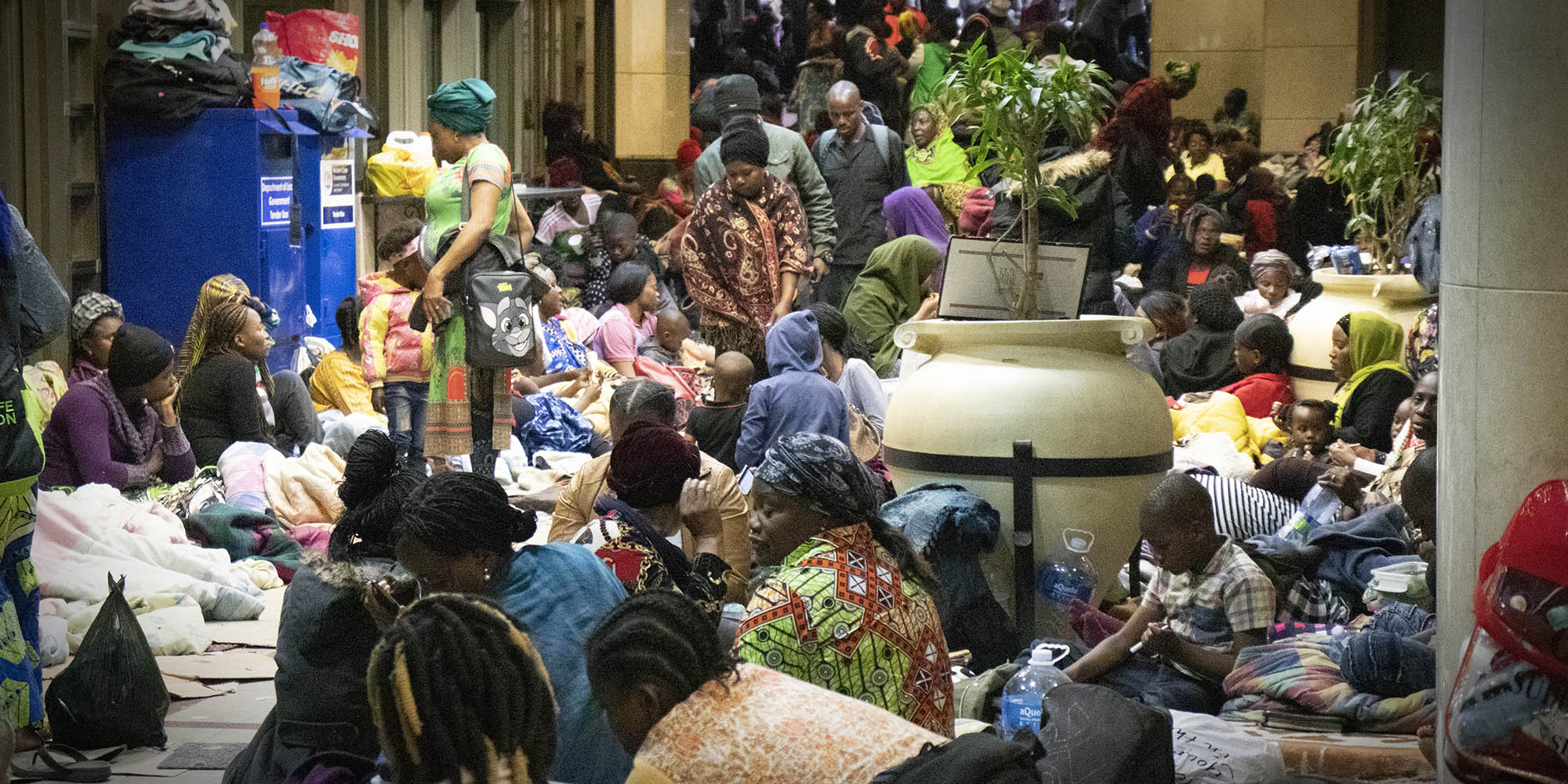 Migrant children in Durban climb the stairs to the apartment where their family lives on the ninth floor. (Photo: Leila Dougan / Daily Maverick)
Migrant children in Durban climb the stairs to the apartment where their family lives on the ninth floor. (Photo: Leila Dougan / Daily Maverick) 